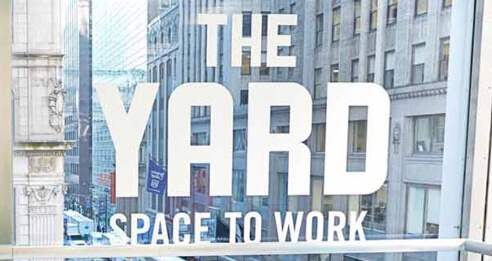
Largest Coworking Companies


The workplace has come a long way from dark and dingy cubicles that were commonplace in the 90’s, we know that for a fact; however, there are a lot of smaller changes that the modern workplace is currently going through that might not be so noticeable for employees.
In this guest post from Advanced Commercial Interiors, we will look at ways to move toward a more flexible, innovative workspace. We’ll point out the smaller changes, in detail, that the office is going through in order to make your staff more aware of how their workplace is changing for the better.

There has been enough research conducted over the past few years to know that offering flexible working within your company benefits everyone.
Employees benefit because it allows them more freedom to work when they work best, rather than being held back by enforced hours. Take me as an example, I work best early in the morning, so I definitely find myself being more productive at 6 a.m. than I am at 5 p.m. Flexible working allows me to work when I work best, making me more productive.
That brings me to the benefits seen by employers. If staff is more productive, thanks to flexible working, then they know that they are making more money, in less time. Staff will be getting their work done faster and better than they ever did before.
Forcing someone who is more productive in the mornings to work late nights is not the way to go. It loses you money and makes your staff a lot less happy than it could be.
As the view on flexible working changes, offices need to change too. Ten years ago, if you were given a job, you were also given a permanent desk. You came into work every day, sat on the same chair and did the same job for years on end.
Those days are long gone and we’re moving toward the future of office design!
Nowadays, hot desks are more common than ever. We have seen the rise of hot desks both in shared spaces and companies offering hot desks to other companies within their own space. Not only is this an additional source of income for businesses, but it also allows them to grow their network with the new companies that come through the door.

It’s rare to see an employee arrive at 9 a.m., sit at their desk and work through to 5 p.m. without moving around a lot. This is not only due to the rising popularity of flexible working hours, but also because it’s now commonplace for employees to get up to go to meetings, work with other people in the office and even eat lunch in the company cafeteria.
As we’ve discussed, the workplace is changing massively. More and more employees are experiencing the benefits of flexible working, but this means that employes also need to make sure their technology can keep up with this demand.
One of the most common ways we see this is with employers providing their staff with laptops rather than static PCs. This not only allows them to move around the building when they need to meet up with members of another department, but is also allows them to take their work home should they need to work remotely the next day.
Employers also need to provide their staff with VPN access keys so that they can access company documents securely while on different networks. This means that their staff is always able to grab documents, no matter if they’re working from the office, a coffee shop or their own home. Ultimately, all this makes their workforce more productive.

Flexible offices have different security vulnerabilities than traditional spaces, but security requirements for both begin at the front door. Every physical space needs to invest in door security, but shared workspaces often have more complex demands—such as 24/7 access and the need to monitor access remotely. Flexible workspace security must also be easy to operate, since members or workers come and go. Flexible offices typically utilize many different coworking space management softwares, like Wun or Cobot, for example. To streamline operations, flexible offices can also consider a physical security program that is cloud-based, so it integrates with the other management software they use. Cloud-based access control systems connect door access to a flexible office’s member CRM. An example of a cloud-based access control system is Kisi, its open API integrates with the IT stack that flexible offices are already using, and programs like these make a flexible office on-demand bookable—this means workers have access credentials on their phone immediately after booking a space and no one needs to be present to let them into the building or conference room.

There are two surprising reasons why flexible offices choose cloud-based access control. The first is that owners can make more revenue with the same amount of space—by making sure that their meeting rooms and hot desks remain rented and no non-paying members or non-member walkins are utilizing the flexible office. The second surprising reason why spaces choose cloud-based access control is that it nurtures the culture that flexible offices endorse—being able to spend time focusing on work, when it works for them. Without wasting time on technicalities, like entering the building between ‘9-5’ or waiting for a superior to let them into a locked meeting room.
Overall, there is a seismic shift happening in the workplace right now. Employers are becoming less and less hung up on the amount of time employees spend at their desks, and instead now focus on creating new ways to nurture productivity.
But the workplace technology is also changing to keep up with this trend. New hardware, security and software technologies are needed to keep up with the rate of change being experienced by the modern workplace. Even something as simple as access control has been revolutionized to ensure that employees are ready for the modern workplace.
Save your community manager 41 hours each week—learn how The Yard did it with cloud-based access control.
Read the Case StudyThe Guide to Make Your Space More Profitable
Including interviews with experts and consultants.
Free access to our best guides, industry insights and more.
